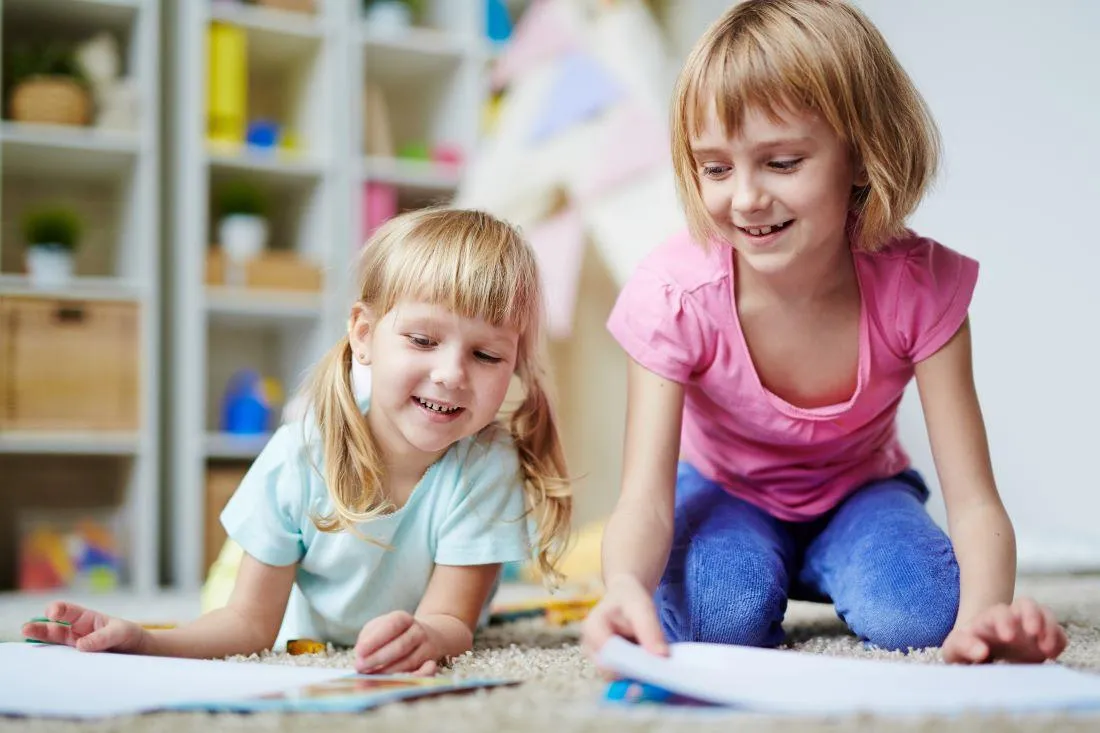
Family Owned and Operated
for 40+years
At Sugar N Spice Daycare and Kindergarten, we recognize that every child is different. Because of this, we go above and beyond to ensure your child receives one-on-one assistance in all early learning activities. We also have an open-door policy for all early learning programs, which means that our phenomenal teachers will keep you updated on your child’s achievements and milestones every step of the way.
CLASSES
Our classes are carefully crafted to meet the development needs of the each and every child. Our educators and support staff are dedicated and thoroughly trained.
Infant Care
Learn more about our infant day care. Under our care, your child will not only develop crucial life skills but also receive the dietary and lifestyle changes needed to stay happy and healthy.
Early Learning
Discover why early learning programs are so important for your child. Whether your child is 6-weeks-old or just entering kindergarten, there’s a place for them at our child care center.
Preschool
Prepare your child for school by enrolling them in a preschool education program. We follow Alabama’s state guidelines to ensure your child for kindergarten readiness
MEET THE TEACHERS
“Our children are our living letters to the world.”- Margaret Mead
Stay in the know with
Our Blogs and Resources

How Kindergarten Builds Life Skills: Problem-Solving, Confidence & Growth
Kindergarten is often viewed as a child's first step into formal education, offering a nurturing environment that fosters growth and development. While the benefits of kindergarten are vast, one of the most crucial aspects is the cultivation of essential life skills in children. From learning to share toys with friends to problem-solving through puzzles and games, kindergarten plants the seeds of vital abilities that will serve kids throughout their lives.
In this blog article, we will explore the various life skills children acquire in kindergarten, such as cooperation, communication, resilience, and creativity. By honing these crucial life skills early on, children are not only better prepared for academic success but also equipped to navigate the challenges of daily life, setting a strong foundation for their future.
The Value of Kindergarten
Kindergarten is more than just an introduction to reading, writing, and arithmetic; it is a critical period for instilling values that will become cornerstones of a child's character. In this early educational setting, children are introduced to the importance of sharing, respect for others, and the joy of discovery.
Kindergarten teachers guide students through structured play, which subtly teaches them the value of taking turns and recognizing the feelings of their peers. This helps to build empathy, a trait that is fundamental for personal and professional relationships. Also, these young learners start to understand the concept of rules and the reasons they exist, which is vital for their development as responsible individuals.
The values instilled in kindergarten create a framework upon which children will build their future learning experiences and social interactions.
Developing Essential Kindergarten Life Skills
Kindergarten goes beyond textbooks. It's a nurturing environment where children are introduced to a variety of "kindergarten life skills" that are essential for success in school and beyond. These skills include:
Socialization and Collaboration: Through structured play and group activities, children learn valuable lessons in sharing, taking turns, and respecting the needs and feelings of others. This builds empathy and cooperation, skills that are fundamental for navigating friendships, teamwork, and communication throughout life.
Emotional Regulation: Kindergarten classrooms help young learners identify and manage their emotions in a healthy way. Teachers provide guidance and support as children navigate feelings like frustration, excitement, and disappointment. This emotional intelligence is crucial for coping with challenges, forming healthy relationships, and achieving goals.
Self-Help Skills: From tying their shoes to putting away their belongings, kindergarten fosters a sense of independence in young children. By learning to complete basic tasks on their own, children build confidence and self-esteem, which are important for future academic success and personal growth.
Following Directions and Routines: Kindergarten classrooms establish routines and expectations that children learn to follow. This sense of structure helps them develop time management skills, focus, and the ability to complete tasks. These skills are essential for success in all aspects of life, from following instructions at school to managing a busy schedule later on.

Fostering Life Skills in Kindergarten
Promoting Sharing and Empathy
In the landscape of early childhood education, promoting sharing and empathy is important. Kindergarten classrooms are the breeding ground for these kindergarten life skills, where educators emphasize communal activities that require students to work together.
For example, during group projects or playtime, children are encouraged to share materials and toys, fostering an understanding of ownership and respect for others' possessions. This regular practice of sharing helps to cultivate empathy, as children learn to consider their classmates' emotions and perspectives. Through guided discussions and reflections led by teachers, children begin to grasp the impact of their actions on others, learning to apologize and make amends.
These experiences are not merely about sharing objects; they are fundamental exercises in building empathetic, compassionate individuals who can cooperate with others—a skill they will carry throughout life.
Kindergarten classrooms cultivate empathy in several ways:
Perspective Taking: Teachers use stories, role-playing activities, and discussions to help children see things from another's perspective. This allows them to understand how their actions might make someone feel happy, sad, or frustrated.
Emotional Intelligence: Kindergarteners learn to identify and label their own emotions as well as those of their classmates. This emotional intelligence is crucial for building empathy and fostering a sense of connection within the classroom community.
Conflict Resolution: When conflicts inevitably arise during playtime or group work, teachers guide children through peaceful resolution strategies. They learn to apologize, offer solutions, and forgive each other – essential skills for navigating future relationships throughout life.
Cultivating Kindness and Compassion
The experiences of sharing and developing empathy within a kindergarten classroom go beyond the immediate moment. These skills weave themselves into the fabric of a child's personality, leading to:
Kindness and Compassion: Children who learn to share and empathize with others are more likely to grow into kind and compassionate individuals. This fosters a positive classroom environment where everyone feels valued and respected.
Strong Social Bonds: Sharing and empathy create a foundation for strong social bonds within the classroom. Children learn to trust each other, build friendships, and feel a sense of belonging in a supportive community.
Life-Long Benefits: The skills nurtured in kindergarten classrooms – sharing, empathy, and cooperation – translate into valuable life lessons that benefit children throughout their lives, both in their academic journeys and in their personal relationships.
Problem-Solving Skill Building
Building problem-solving skills is a fundamental component of kindergarten education. Through various activities and challenges, children learn to think critically and develop solutions to problems both big and small. Puzzles, block building, and sorting games are not only fun but also teach children to identify patterns, make predictions, and understand cause and effect.
These activities, while seemingly simple, are critical in teaching young minds how to approach a problem, consider different outcomes, and decide on the best course of action. Teachers support this development by asking open-ended questions and encouraging children to explore multiple solutions. In doing so, they help students learn that making mistakes is a part of the learning process, and that persistence is key.
These problem-solving abilities are essential kindergarten life skills that children will use in all areas of their future academic and personal lives.
Building the Blocks of School Success
Kindergarten serves to prepare children for school, laying the groundwork for the academic journey ahead. Within the kindergarten setting, children learn to navigate social settings, understand the importance of listening, and follow classroom routines.
This early education places significant emphasis on the basics of school etiquette, such as raising hands to speak, waiting in line, and respecting teachers and peers. As children participate in group activities, they also learn to be aware of their behavior and how it affects those around them.
This foundational skill set is critical as it teaches children how to function in a group setting, respect authority, and build the self-discipline necessary for learning. Teachers play a vital role in modeling positive behavior, reminding students of guidelines, and reinforcing good practices.
These kindergarten life skills are crucial for creating an environment conducive to learning and collaboration.

Kindergarten Learning and Daily Life
The morals and values taught in kindergarten classrooms extend far beyond the school's doors, influencing children's behavior at home and in their broader social environments. As children learn the importance of sharing, empathy, and respect in the classroom, these kindergarten life skills seamlessly weave into family dynamics.
Parents often notice their children demonstrating improved manners, greater willingness to help with chores, and better conflict resolution with siblings.
By reinforcing the positive behaviors and morals learned at school, such as patience and kindness, parents can help their children internalize these lessons. Moreover, it encourages consistency between home and school, which is essential for children to feel secure and supported in their development.
Engaging in conversations about the child's day at kindergarten provides opportunities for parents to discuss and nurture these growing life skills, making the morals learned in the classroom a natural part of daily life.
The Lifelong Impact of Kindergarten
By engaging in kindergarten programs, children gain a head start in developing social skills, emotional intelligence, and the ability to navigate the complexities of group dynamics. These kindergarten life skills serve as building blocks for future learning, giving children the confidence to tackle new challenges and the resilience to bounce back from setbacks.
To learn more about the impact of early learning, read our article and discover more ways children’s skills blossom!
“Give your child the head start they deserve.
Register now and watch them grow in confidence, creativity, and connection.”
👉 Start Your Registration
Enroll Your Child Today
Sugar N Spice Day Care & Kindergarten is proudly accepting new enrollees. Call our day care center today to hear more about our early childhood education opportunities or to schedule a tour.

2026 © Sugar N Spice Day Care & Kindergarten, LLC, All rights reserve
Privacy Policy | Terms and Conditions
Powered by Kyrios Systems
